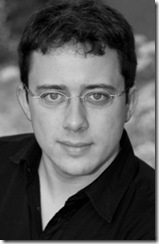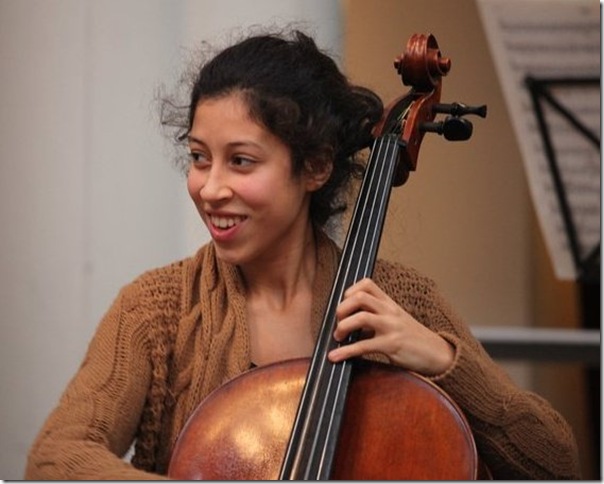If you were to list the names of prominent scientists who also were interested in music, you’d be at it for some time.
Along with the more or less well-known examples of chemist-composer Alexander Borodin, physician-organist Albert Schweitzer and physicist-violinist Albert Einstein, you could find any number of physicians, chemists, botanists, surgeons, astronomers and the like who spend at least some of their time pursuing music as an avocation.
But it’s not just about culture. It’s also about how the human brain works.
Earlier this year, the Max Planck Florida Institute for Neuroscience in Jupiter began presenting a series of talks called “Science Meets Music,” in which a brief lecture about some of the Planck Institute’s research alternates with musical performances presented by the Boca Raton-based American Friends of Kronberg Academy.
The American Friends is the U.S. non-profit fundraising arm of Germany’s Kronberg Academy, founded 21 years ago, which offers what is essentially a post-graduate education in career-building and performance for violinists, violists and cellists. Established by cellist Raimund Trenkler in the small medieval city of Kronberg, not far from Frankfurt, it counts some of the world’s leading string players as its faculty members, including Gidon Kremer, Yuri Bashmet and Gary Hoffman. The eminent Russian cellist Mstislav Rostropovich was closely associated with Kronberg until his death in 2007.
The last of the three lectures this year, which takes place tonight, features the young Dutch cellist Ella van Poucke. She will be accompanied by the South Korean pianist Yoonie Han, who in January was a headliner at the Flagler Museum music series with her Gloriosa Trio. Van Poucke and Han will play the Schumann Fantasy Pieces (Op. 73) and the Adagio and Rondo of Carl Maria von Weber.
 The talk, titled “Mapping the Brain’s Network,” will be given by Dr. Moritz Helmstaedter, principal investigator at the Max Planck Institute of Neurobiology in Munich. The lecture-concert will be given in the atrium of the Planck building in Jupiter. The Kronberg’s participation is sponsored by local arts patrons Jimmy and Becky Mayer.
The talk, titled “Mapping the Brain’s Network,” will be given by Dr. Moritz Helmstaedter, principal investigator at the Max Planck Institute of Neurobiology in Munich. The lecture-concert will be given in the atrium of the Planck building in Jupiter. The Kronberg’s participation is sponsored by local arts patrons Jimmy and Becky Mayer.
Axel Langhorst, who leads the American Friends of the Kronberg Academy as its president out of an office at the Steinway Gallery in Boca Raton, said the academy has a three-year agreement with the Planck Institute for the series, and that in itself is somewhat unusual. The Jupiter neuroscience institute is the first American branch of Germany’s vast Max Planck Society, a 66-year-old scientific research conglomerate with 80 separate institutions and more than 21,000 employees.
“They first had their doubts, because Max Planck is a very careful, prestigious, large organization that stands on its own. It doesn’t partner with anyone,” he said, but added that it has partnered for a similar series in the past at the Bavarian State Opera in Munich, the Planck Society’s home city. “But so far, the first two sessions have met with the same response from their following and ours: It’s been amazing.”
The first two lectures were given by David Fitzpatrick, CEO of the Jupiter Planck Institute (“Fantastic Journey: A Guided Tour of the Cerebral Cortex,” Jan. 7), and Ryohei Yasuda, a scientific director at the institute (“The Moment of Memory Formation: A Spotlight on the Brain,” Jan. 29, given at the Royal Poinciana Chapel in Palm Beach). The Israeli-born violinist Itamar Zorman, who was the soloist at the Palm Beach Symphony’s January concert, gave the first two Science Meets Music presentations with pianist Han.
In August 2009, the American Friends made its debut in Boca Raton, with a mission to foster the development of American string players. Over the years, AFKA has sponsored concerts at the Kravis Center, the Steinway Gallery and a Delray Beach art gallery; performers have included the fine Russo-British violinist Alexander Sitkovetsky and the excellent Chinese-born violist Peijun Xu.
“[Our mission] is definitely to give the young soloists exposure in America, provide them with opportunities to perform, be the ambassadors of the Academy, and also to attract awareness and support for the Academy,” Langhorst said.
Over the years, the Kronberg Academy has expanded its work to include degree-granting programs with Frankfurt University and courses with the Manhattan School of Music in New York. It has an extensive biennial chamber music series called Chamber Music Connects the World, and within the next few years, it will open a new $12 million concert venue, the Rhein-Main Chamber Music Hall, in Kronberg.
Van Poucke’s appearance at the Planck lecture will be followed Friday by an outreach appearance at the Faith’s Place arts education center for children in Riviera Beach, and on Sunday she will play music of Bach and Franck during a service at the Royal Poinciana Chapel.
Getting its musicians out into the community is central to Kronberg’s plans, Langhorst said.
“The plan is to get broader international exposure, and to use the American Friends to create the nucleus of an international advisory board, which will be launched in June,” he said. “The thought is to broaden the donor base for the academy. For that reason, we’ll reduce the public recitals and concentrate more on outreach programs and private donors with house concerts, and we’ll be involved in an effort with the schools to bring younger people to the music.”
Helmstaedter’s lecture tonight will focus on the science of the emerging field of “connectomics,” in which researchers are attempting to map the networks of nerve cells in the brain in order to figure out the functionality of “the stunning computers that are operating in our heads,” according to the lecture series abstract for the talk.
If that sounds like too much demystification, it’s worth noting that all the lectures in the Science Meets Music series begin with a solo work by J.S. Bach, Langhorst said. Van Poucke will play three movements — the Prelude, Sarabande and Gigue — from the Suite No. 3 in C (BWV 1009).
“You hear, and you experience, what a human brain — a brain like Bach’s — produced,” he said.
The Science Meets Music lecture at the Max Planck Florida Institute for Neuroscience begins this evening at 5:30 p.m. with a reception, followed at 6:30 by the concert and lecture. The event is free, but seating is limited. RSVP to 561-972-9027 or send an email to rsvp@maxplanckflorida.org.
